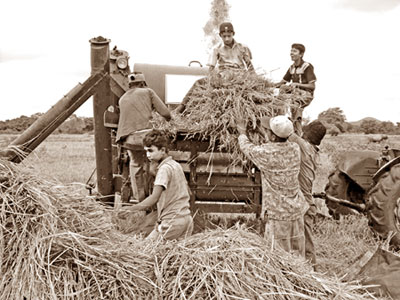Heading for sustainable food security
The ascent of agro-technology as well as
benevolent farming policies have drawn Sri Lanka towards sustainable
food security for good. It is abundantly clear that the doomsday
predictions of food shortages of the 90s have been dispelled
irrefutably. The overall allocation for paddy purchases during the
current Yala season reached a colossal Rs three billion this July
 We
are getting into an era of high-yielding, disease and insect resistant
varieties of crops as a rule now in Asia. Sri Lanka’s Mahaveli farmers
had harvested successive good crop seasons in a row. Years of sustained
growth policies have paid off. We
are getting into an era of high-yielding, disease and insect resistant
varieties of crops as a rule now in Asia. Sri Lanka’s Mahaveli farmers
had harvested successive good crop seasons in a row. Years of sustained
growth policies have paid off.
The urgency of changing consumption patterns, averting adverse
climate damage, protecting the amount of arable land and ensuring
adequate water levels are vital to the scenario described above.
|

Agri economy leads the economy to a new era. File photo |
Overall, we are better equipped in achieving the massive increase in
food crop production (at least 50 percent increase) that will be
required by 2050 to meet global food demands. Additional three billion
would enter the population stream by that date.
Wagering better times
Farming predictions are in for better times. Matt Ridley a well-known
British agro-science writer in his book The Rational Optimist has
convincingly made a case that collective innovation by human beings has
taken root perhaps in a far more profound manner than our mastery over
language or capacity for imitation and social learning earlier on. Matt
has drawn from the underlying Darwinian theory of evolution as well as
Adam Smith fee enterprise prognosis.
Matt describing how prosperity evolved over the decades made the case
that our planet is not in a precipitous freefall as suggested by some.
Progress in innovation amidst occasional retardation is the central
theme of Ridley’s monumental work. He believes that humans are uniquely
distinguished by the ability to innovate.
He added that specialization is inherently germane to all this. The
cumulative improvement occurring in society is at its zenith now.
Technologies are being improved at a faster pace.
Several others have also drawn from the so called “faster
amortization of capital” idea that capital is no longer held in bondage
confined to a few monopolists but in a broad-based ownership pattern.
Thanks to the accessibility to the Internet, knowledge is no longer the
exclusive prerogative of a few. Production of wealth seemed to occur
with the least amount of effort and capital-unprecedented in human
history.
Benefit to agriculture
Ridley believes that agriculture is benefitting from the
technological progress as never seen before. No matter which way we look
at it there is indisputable statistical proof that we are better off
every decade than the one before. Ridley cites the examples such as
California’s clean air innovations that wiped out the haze of the ozone
pollution, the vaccination rates in Bangladesh that took care of many
diseases and the life expectancy progress in Japan unheard of before. We
could add our own rice growers in the Mahaveli region or China’s
spectacular expansion in growing crops. These successes herald greater
things to come.
To cap it all, access to information has offset many of the evils of
globalization that had provided the West an entrenched advantage. The
off-setting phenomenon is there now-the farmer in Asia could access
knowhow as easily as anyone elsewhere with the click of the “mouse”.
Thanks to rapid research engines like Google or Bing. Innovation is no
longer the birthright of the privileged or the rich.
Technocrats do not thrive on ivory towers but work amidst the average
farmers and factory hands trying to improve their methods of production.
Capital is no longer the preserve of a few. Networking is now the norm.
We are inching towards the goal of feeding a world as humungous as
three billion or more. It is not a presumptuous prediction but a
testimony to our greatest achievement, innovation infinite in quantity.
The emphasis is on new approach to crop management including modified
irrigation regimes, seed treatments to protect against pests and
diseases: all germane to better farming. The new breed of farmers now
recognizes their applicability.
The new mindset takes into account agro-ecological approaches probe
the potential interactions between plants, animals, microorganisms and
the physical environment within agricultural systems-avoiding trial and
error methods. It is well-known that the ‘push-pull’ system for pest
management in maize crops has worked very well.
By growing a border of Napier grass which is more attractive to moths
than the maize for laying their eggs, yields have grown up
substantially. In addition, rows of maize are intercropped with rows of
the forage legume silver-leaf which repels stem-borer moths away from
maize.
As I write there is news that over 100,000 acres of arable land lying
fallow due to the war are being readied for food production.
Farmers in Jaffna, Kilinochchi and Mullaitivu would be provided with
two bushels of seed paddy each in the coming season. More than 137,650
acres of fallow fields have been cultivated in the three areas so far. |



